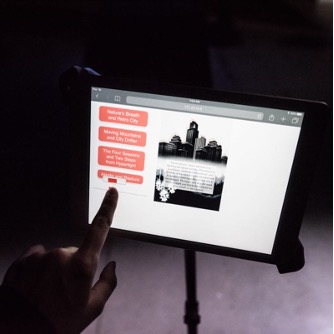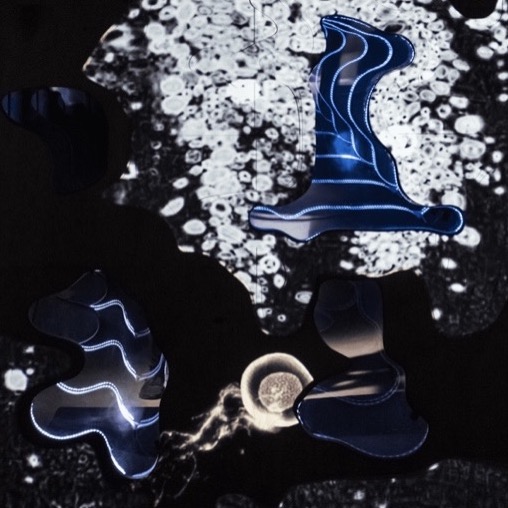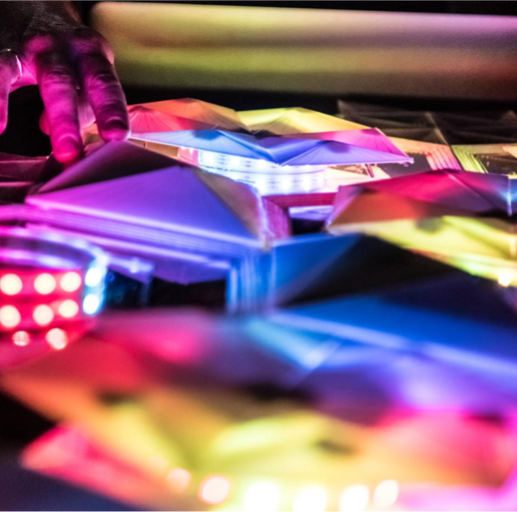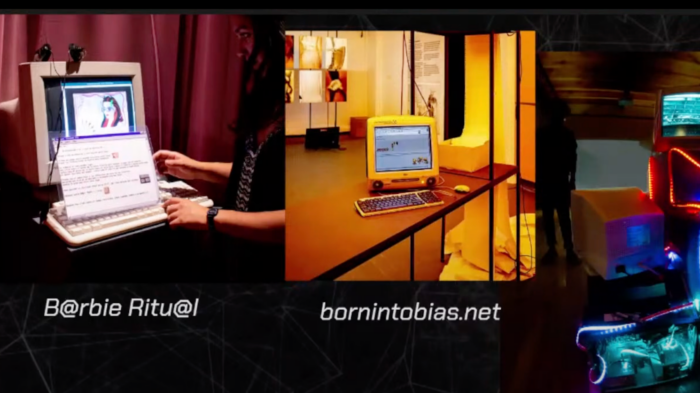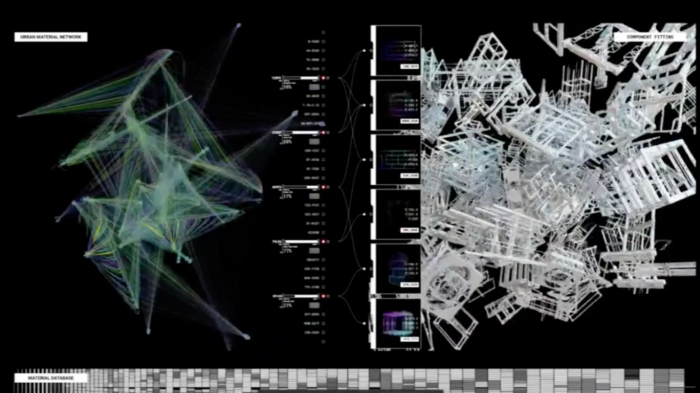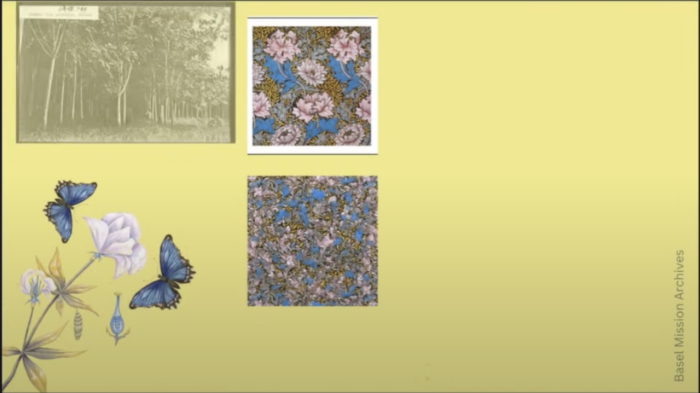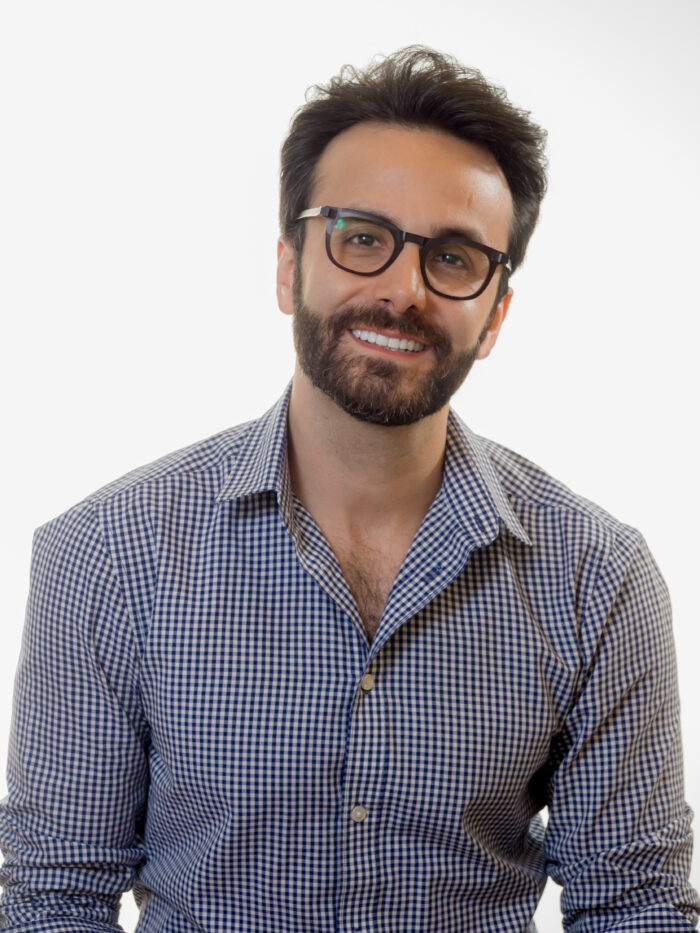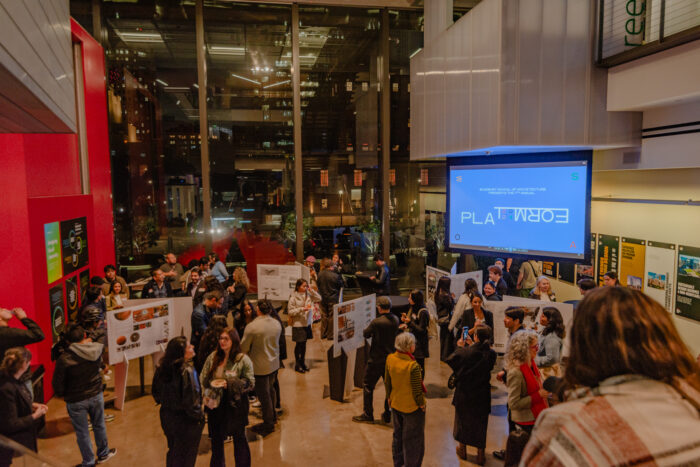School of Architecture
Applied CS – Media Arts
Bachelor of Science [STEM Program]
The Bachelor of Science in Applied Computer Science – Media Arts trains innovative professionals who affirm the power of creative technologies to face the demands of the 21st-century marketplace. This is an art and technology hybrid degree focusing on emerging digital practices as a tool to innovate within the fields of digital design, entertainment, and media arts. This STEM degree transitions students into technological innovators and professionals who possess the ability to generate innovative design solutions using cutting-edge technologies.
Applied CS – Media Arts is a STEM-designated program. Learn more about STEM at Woodbury.
 Applied CS – Media Arts was brought to Woodbury University by a $3 Million US Department of Education Title V Grant.
Applied CS – Media Arts was brought to Woodbury University by a $3 Million US Department of Education Title V Grant.
Applied CS – Media Arts Curriculum
The Applied CS – Media Arts curriculum is structured around three main categories of classes: Design and Media, Programming, and Hybrid Studios. Each one has been designed to work with a specific technology and high-demand programming skills applied to a creative environment.
Design and Media
Starting with a strong foundation in design and composition, students will explore visual arts in different contexts: two- and three-dimensional modeling, animation, digital fabrication, digital media, interactive prototyping, and experiential design.
Programming
The Applied CS – Media Arts program has a rigorous programming sequence starting at freshmen year. During the degree, students will become proficient in several programming languages and their applications. By paying special attention to the development of a broad set of technical skills, this program opens a full new world of experimentation for our students.
Hybrid Studios
The hybrid courses are unique to the Applied CS – Media Arts program. Each one has been carefully designed to work with a specific, cutting-edge technology and high-demand programming skills applied to a particular creative environment. These courses make the Applied Computer Science – Media Arts program unique in its field. Examples of these classes are interactive prototyping, media environments, or the Mixed Reality sequence.
Courses
Click below to see a draft of our course requirements and curriculum flowchart.
CSMA 100: ACS Lecture Series 1
The Applied Computer Science Lecture Series features practitioners from a wide range of creative and scientific fields, all of whom incorporate technology at the core of their professional inquiry. Open to the entire Woodbury community, this course aims to foster dialogue around the increasing role of technology in society, its application across a diverse range of professional practices, the resulting explosion of creative and expressive modes of production, and the ethical and moral dilemmas that have emerged as technology has evolved. Each week the students will be given four questions to answer after participating in the lecture. This weekly practice will enable them to learn how to engage in a discussion with each lecturer, as well as reflecting on various research methodologies and fields.
CORE 101: Computer Science I
This class provides a foundation in computational literacy, allowing students from a variety of disciplines to read, write and interpret code. The course will inform through assigned readings, lectures, and workshops that programming is not only technical skill but an essential form of literacy. It serves as a standalone course for those seeking to understand the basics of programming. The course structure is based on the “creative coding” model, in which students work with programming languages to produce interactive graphics beginning on the first day of class. Principles such as conditional statements, Boolean operations, loops, functions, and classes will be covered in an applied manner, allowing students to tie syntax and semantics of code to real-time graphics.
GDES 107: Digital Practice
This course is an introduction to the fundamentals of digital technology, including their roles in the creation, reproduction, and distribution of visual messages. Students will study major drawing and imaging software used in the graphic design industry. They will also become familiar with digital tools and terminology as they apply to creative visual communication.
FOUN 102: Design and Composition
This course introduces students to the elements and principles of design and to the processes of design thinking. Formal visual properties of line, shape, form, pattern, value, texture, and sequence are studied in their relationship to content and compositional organizing systems. Studio exercises using various media explore concepts of balance, harmony, repetition, rhythm, scale, and time in two, three, and four-dimensional organizations. Emphasis is placed on developing creative design concepts, gaining practical problem-solving skills, and communicating project solutions visually and verbally. Examples of historical and professional art and design are presented so that students may recognize their influence on contemporary design and to relate their own design efforts to a larger cultural context.
Interdisciplinary Core Elective
Unrestricted Elective
CORE 102: Computer Science II
This course introduces basic principles of algorithmic and object-oriented problem solving, programming language concepts including control structures, data types, classes. It also provides an introduction to Arrays, Inheritance, File I/O, and GUIs. Problem analysis, program design, development and implementation, and related topics are covered. Students complete several programming projects using an appropriate computer language.
CSDC 111: Technology and Making 1
This course will introduce students to the fundamental principles of design with computational tools. The class will ask students to design a computational model in the pursuit of a specific design problem. The potential of computational tools to enable and structure the design process through both iterative and variant based design strategies will be explored. Types of representation such axonometry, orthography, perspective will be examined in both renderings and line-based representations.
WRIT 113: First-Year Academic Writing
This course is taken during the first year and provides the foundations for inquiry-based, research writing. The writing tasks in this course help students build confidence as readers, writers, and critical thinkers by teaching them how to develop, organize, and effectively communicate their own ideas alongside those of others. Students learn to analyze writing and logic, develop and practice the strategies important for effective research writing, and reflect on their own writing and writing processes.
LSCI 105: Information Theory & Practice
This course is an introduction to the production and dissemination of information and knowledge. Using networked information systems, traditional scholarly resources, and evolving delivery systems, students develop an understanding of concepts underlying the research process, as well as skills in retrieval and critical evaluation of resources appropriate to university-level research. Provides experience in the ethical use and presentation of research results with correct documentation styles, and the application of knowledge and skills to research assigned in other courses.
MATH 249: College Algebra
This is a course in algebraic functions. Topics include but are not limited to: relations, functions; inverse functions; the algebra of functions; polynomial, rational exponential, and logarithmic functions. Course content is covered in three realms: symbolic, graphic and the written word. In addition, each topic includes components of problem solving and applications.
Ethics Elective
CSMA 202: Media Programming 1
This course introduces intermediate programming concepts through the construction of interactive experiences for the web by building on programming fundamentals learned in the introductory programming course. Students will learn software design patterns, synchronous and asynchronous programming, unit testing, version control, hosting, data formats and how to work with an API. Students will create interactive works using a variety of backend and frontend technologies. Possible projects include interactive data visualization, networked games, and responsive design.
GDES 207: Digital Media
This is an intermediate course in the study and practice of software applications used for the creation and production of motion-based design. Emphasis is on fundamental animation techniques, developing narratives appropriate for motion graphics and compositing imagery, video, and sound. Students will also gain further experience in the creation and animation of 3D assets.
CORE 201: Data Structures and Algorithms
This course provides a study of algorithms and their related data structures, including linear lists, linked lists, trees, graphs, sorting techniques, and dynamic storage allocation. The algorithms are used to manipulate these structures and their applications. Applications are implemented using an appropriate computer language.
MATH 251: Trigonometry
This is a course in trigonometry with topics including radian measure, algebraic and trigonometric functions, inverse functions, trigonometric identities and equations, vectors, laws of sine and cosine, vector algebra, and projection.
ARTH 206: History of Electronic Art, Media
This seminar ties together major themes and movements in the history of the arts, science, and technology up to the present day, and will explore the influence of electronic media on contemporary artistic practice from the 1960s. Students will examine a wide array of new media, including electronics, robotics, video games, the web, and virtual reality, and will learn to identify major technological and artistic innovations that often drive disruptive societal change. Throughout the semester, students will complete regular writing assignments and presentations, culminating in a research paper.
CSMA 113: Mixed Reality
This class will explore various platforms for the design and creation of AR and VR applications. Emphasizing hands-on experimentation, this experiential studio is meant to be a collaboration between programmers and designers to research and develop new paradigms for user experience and new pipelines for the creation of 3-D content. Using the Unity game engine and various hardware equipment, such as the Microsoft HoloLens, HTC Vive, and mobile devices, students will work individually and in teams to practically apply novel design principles, culminating in a semester project demonstrating a critical approach to designing for these emerging forms of media.
CSMA 213: Artificial Intelligence for Media
This course explores the principles of Artificial Intelligence focusing on the development and deployment of machine learning algorithms. Lectures and reading assignments for the class aim to provide a broad overview of the contemporary research, best practices and applications in the fields of robotics, data analytics, audio analysis, computer vision and other areas. Practical approach to engaging with the subject material will be emphasized through hands-on programming assignments and exercises, including applications of machine learning at the hardware level using sensors and embedding computing platforms. Employing state of the art software frameworks with a creative approach to problem solving, students will understand core concepts involved in machine learning to begin developing expertise with intelligent algorithms, neural networks, training data sets and more.
CSDC 212: Technology and Making 2
This course will introduce students to the fabrication of objects through the use of computational tools. The class will ask students to develop a computational model that generates a series of fabrication-ready digital files. Issues of material tolerance, nesting, connections, and hybrid modes of fabrication will be explored in the model. In addition to the digital portion of the class, a hands-on approach to digital fabrication will require students to use a variety of digital and conventional tools within Woodbury University’s making complex.
MATH 252: Discrete Mathematics
An introduction to the mathematics of computer science. Logic and Boolean algebra, discrete logic circuits (apps of and/or/nor), number systems, proofs, set theory, matrix theory, counting methods, discrete probability, sequences, induction, recursion, counting, and graph theory (including trees).
CSMA 112: Interactive Prototyping
A hands-on introduction to the design and creation of interactive prototypes that form the basis of intelligent objects and spaces in the sphere of media, art and design, architecture, wearable technology, and IoT (Internet of Things). In the course of the semester, students will acquire practical electronics and embedded programming skills by experimenting with technologies such as microprocessors, sensors, actuators, and LED lights, using them in conjunction with the software tools, source code libraries, and network services facilitating their applications. Class sessions will focus on the design and construction of electronic circuits used to explore real-time interaction. Students will complete regular programming assignments, culminating in a collaborative installation project that integrates the hardware and software technologies, concepts, and programming techniques covered in the course.
CSDC 250: Programing Portfolio
This course will provide students with principles and tools for the design of a professional portfolio. Students will use online resources to generate a web-based portfolio that contains evidence of computational proficiency and design proficiency through the display of objects, images, time-based media, and student-built interfaces. The portfolio itself will be considered an object of design and principle of use interface and experience will be discussed and implemented.
CSMA 312: Mixed Reality 2
Building on the foundations laid in the Mixed Reality course, this class will dive deeper into computer science and programming topics as they relate to developing consumer-ready mixed reality experiences. Topics covered will include inter-device networking, efficient architecture, and mobile optimization. Students will also be encouraged to consider critically the current and future state of virtual and augmented reality through hands-on experience with hardware such as consumer VR/AR devices, emerging hardware prototypes or development kits, and mobile devices. Students will work individually to develop a mid-term project demonstrating proficiency in developing software for user-facing experiences, which will culminate in a semester project demonstrating proficiency in developing network software and meeting agreed-upon standards.
CSMA 302: Media Programming 2
This course serves as a culmination of the programming sequence of the ACS department by building on programming fundamentals learned across the degree. This class will explore low level programming and computer science practices at the machine level. Students will work with complex algorithms, abstract data types, recursion, and increment their problem-solving skills. The students will also practice real world case scenarios such as software team assembly, best version control practices, and code review.
GDES 116: Typography
This course is an introduction to the fundamentals of typography, including its theory, practice, technology, and history. Emphasis is on the study and practice of typographic vocabulary, anatomy, proportion, grids, hierarchy, and legibility in type applications. Students will analyze typographic solutions and their impact on visual communication messaging.
ENVT 220: Environmental Studies
This course provides an overview of topics including ecosystems, biodiversity, mineral and nutrient cycles, sources of energy, waste and pollution, and environmental movements and philosophies.
CSMA 212: Media Environments
This experimental studio covers the recent techniques, aesthetics and applications of experimental design, with a focus on interactive and immersive environments at a human scale. It is a hands-on hybrid Art and Technology course that will cover topics such as the design of real-time generated graphics, audio-reactive visuals, projection mapping, programming interactive installations and other creative prototyping tools.
CSMA 311: Design/Tech Exploration
This hybrid art-and-technology course serves as a continuation of CSMA 212 Media Environments. This studio aims to find a balance between design, programming and hardware implementations. Students will research and produce a series of creative works surrounding a particular topic, culminating with the development and presentation of a proof of concept. We will look at contemporary examples in the field and carefully study and examine the projects from ideation to final production by paying special attention to the design, exploration and the production process. Work is expected to be highly creative and demonstrate proficiency in core programming and technical concepts.
GDES 356: Interaction Design 2
This is an advanced studio course exploring the design of web-based user interface applications across multiple devices. Emphasis is placed on the design of navigational structures and systems, audience, organization of information and access to web applications. These applications and structures will be evaluated for their responsiveness and usability across multiple devices.
WRIT 313: Advanced Academic Writing
This course builds upon the foundations of WRIT 113 by helping students transfer those writing strategies to new situations, purposes, and audiences for both upper-division academic writing and professional contexts. Through the lens of a course topic, writing in this course aims to make transdisciplinary connections that benefit all students regardless of major, but encourages students to engage with issues within their major and future profession.
CORE 301: Applied Artificial Intelligence
This course provides an introduction to the basic principles, techniques, and applications of Artificial Intelligence. Some of the specific topics include knowledge representation, logic, inference, problem solving, search algorithms, game theory, perception, learning, planning, and agent design. Students will experience programming in AI language tools. Potential areas of further exploration include expert systems, neural networks, fuzzy logic, robotics, natural language processing, and computer vision.
Natural Science with Lab Elective
Work Experience
CSMA 401: Thesis 1
This course is the first semester in the development of a student-led Senior Thesis project with a focus on technological explorations and functional prototyping of individually-developed software, hardware and/or mixed media prototypes. With guidance from the instructor, students are expected to engage in independent research, identify an area of interest and determine the scope of a year-long project demonstrating technical proficiency, conceptual originality, creative problem solving and critical thinking. Students will complete a thesis proposal with supporting documentation and defend the core concepts synthesized as part of their research and development process.
MDST 120: Public Speaking
This course provides a study of the oral presentation of ideas and feelings that blends contemporary communication theory with traditional approaches to public address. This course also provides experience in public speaking, interpersonal communication, and critical listening.
UD Interdisciplinary Elective
General Education Elective
Social Science Elective
CSMA 402: Thesis 2
This advanced capstone course will focus on technological explorations and functional prototyping for the senior thesis project. Focus will be placed on individually-developed software, hardware and/or mixed media prototypes. Students will complete their thesis proposal including documentation, and defend the core concepts synthesized as part of their research and development process. They will demonstrate technical proficiency, conceptual originality, practical methodology, creative problem solving, and critical thinking in the implementation of their project. Final review will include presentation to the student’s faculty review committee and presentation in the Applied Computer Science Showcase. Continuation of CSMA 401, Thesis 1. Part two of a two semester sequence.
CSDC 480: Professional Practice
This course introduces students to the principles and practices that are central to contemporary ways of working in a professional setting. It asks how we work with digital tools. The course examines the reciprocity between changes in technology and changes in working methods. Working in groups on real-world problems, students will learn about a range of practices, from Extreme Programming and Lean Manufacturing to contemporary agile methods such as Scrum. The course ends with a survey of workflows central to contemporary design practice, from conception to fabrication. Throughout, students will be asked to consider questions of equity in the workplace and how our working methods reinforce and challenge social and cognitive biases.
UD General Education Elective
Unrestricted Elective
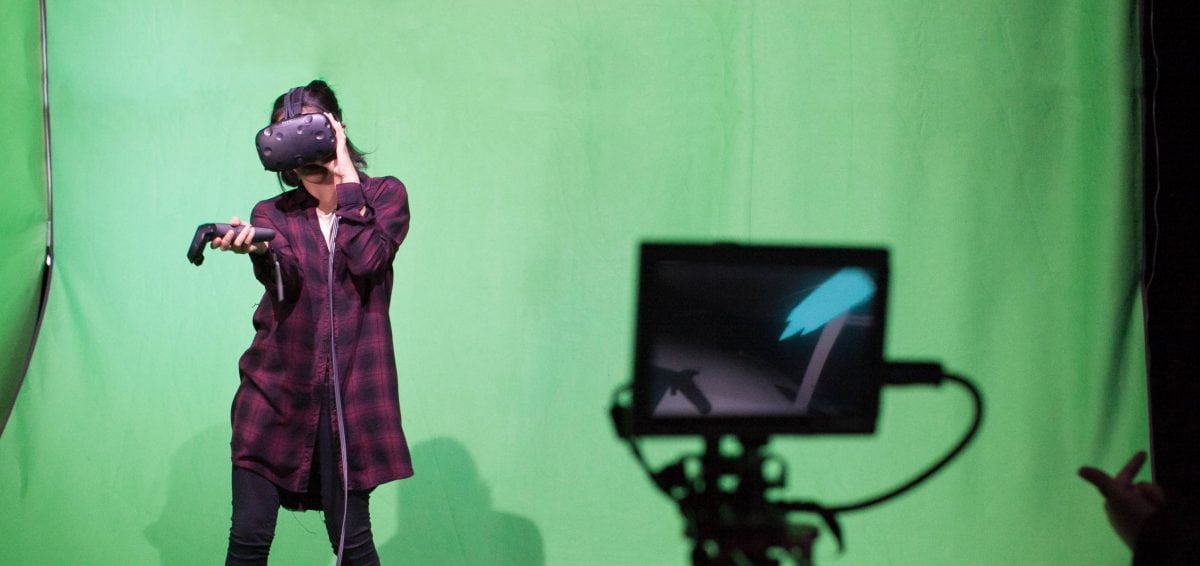
Opportunities
Internship opportunities
Internships are a required component of the B.S. in Applied CS – Media Arts.
- NASA Jet Propulsion Laboratories
- Microsoft
- Nickelodeon Animation Studios
- Oblong Industries
- Two Bit Circus
- Code Headquarters
- Fancy VR
- Audio Design & Service
- IMAX Corporation
- Architectural Technology Laboratory Venture
Career opportunities
The Applied CS – Media Arts degree opens a wide range of potential careers. Some of the more common paths include:
- Multimedia Artist
- Mixed Reality Developer
- UX/UI Designer
- Web Designer
- Interactive / Immersive Experience Developer
- Creative Developer
- Art + Technology Director
- Gaming Environment Developer
Scholarships from Microsoft are available for students applying to Woodbury’s Applied CS – Media Arts program.

Alumni Spotlight
Applied CS – Media Arts
Matthew Gonzalez
Matthew Gonzalez is a creative developer, designer, and programmer working at the intersection of art and technology. Since 2018, he has worked primarily with NameTheMachine, a software and media development company with a focus on emerging technologies and transmedia solutions, helping to develop applications for live shows, performances, and interactive media installations. More specifically, Matthew’s work has ranged from research and testing of various hardware/software protocols, graphic design and layout in 2D and 3D, computer programming, GUI design and implementation, and virtual reality tool design and testing.

Alumni Spotlight
Applied CS – Media Arts
Frida Figueroa
I’m Frida Figueroa, and my academic path is a reflection of my interest in the fusion of creativity, technology, and design. My Bachelor’s degree in Architecture (BArch), with a minor in Applied Computer Science–Media Arts (ACSMA), from Woodbury University, served as the cornerstone of my academic pursuits. During my time at Woodbury, I enhanced my design thinking skills and developed an understanding of the power of computational tools in architectural innovation. It was here that I realized the potential of merging architecture with technology and programming, allowing me to create innovative designs that harmonized aesthetics with functionality.
Inspired by the programs and cool projects I created during my minor at Woodbury, I decided to take this passion further. This led me to pursue a Master’s degree in Media Arts and Technology at the University of California, Santa Barbara (UCSB). At UCSB, I had the opportunity to dive deeply into the world of digital media, interactive design, and the integration of technology with creativity. My background in ACSMA not only reinforced my skills but also enabled me to create projects that seamlessly bridged the gap between architecture and technology.

Alumni Spotlight
Applied CS – Media Arts
Seba Alabdullatif
My undergraduate studies in Architecture (BArch), at Woodbury School of Architecture ignited a realization of the possibilities for interdisciplinary thinking. I developed an interest in blending different mediums and diverse modes of thought into my creative process. Pursuing a minor in Applied Computer Science–Media Arts (ACSMA) facilitated this transformation, enabling me to adapt my architectural mindset to the digital sphere. This not only refined my architectural perspective but also enriched my creative thinking.
The dynamic interplay between architecture and technology catalyzed the evolution of a distinct language in my work. I believe the ACSMA program not only equipped me with a wide range of tools, but also allowed me to think differently and provided a new lens in which I can see my work through.
Having graduated from Woodbury in 2023, I am currently pursuing my Master’s degree at NYU (New York University) in the Integrated Design and Media program, where I continue to explore the synergies between architecture, media, and technology.
Applied Computer Science Lecture Series
The Applied CS Lecture Series features practitioners from a wide range of creative and scientific fields, all of whom incorporate computational design and applied computer science and technology at the core of their professional inquiry.
Faculty
Our faculty are artists, designers, computer scientists, and policy makers practicing in Los Angeles, San Diego, and Tijuana. This internationally recognized and award-winning group works closely with students to teach the skills required to push the limits of practice.
A Message from the Chair
Dr. Arash Soleimani
Associate Professor & Chair, Design Computation & Applied CS – Media Arts
We imagine a future of inclusive educational environments in which students, faculty, and community members collaborate through mindful explorations, technological innovations, iterative experimentations, and critical analysis.
Our Applied CS – Media Arts and Design Computation programs combine innovative design thinking and insightful research to understand how emerging technologies and the cyber-physical environments where people live, work, and play impact our daily lives. Our graduates are changing the world in the art, design, and technology industries by engaging in interdisciplinary collaboration among professional domains of expertise.
Ready to learn more?
Feel free to reach out to me to talk about the program! Email me at [email protected].
STEM Designation
The Applied CS – Media Arts program has been designated as a STEM degree. All international students who receive Applied CS – Media Arts degree can now apply for a 24-month extension of their post-completion OPT (Optional Practice Training), and they can work in the USA for 36 months or three years.
Accreditation
Woodbury University is accredited by WSCUC: Senior College and University Commission.
